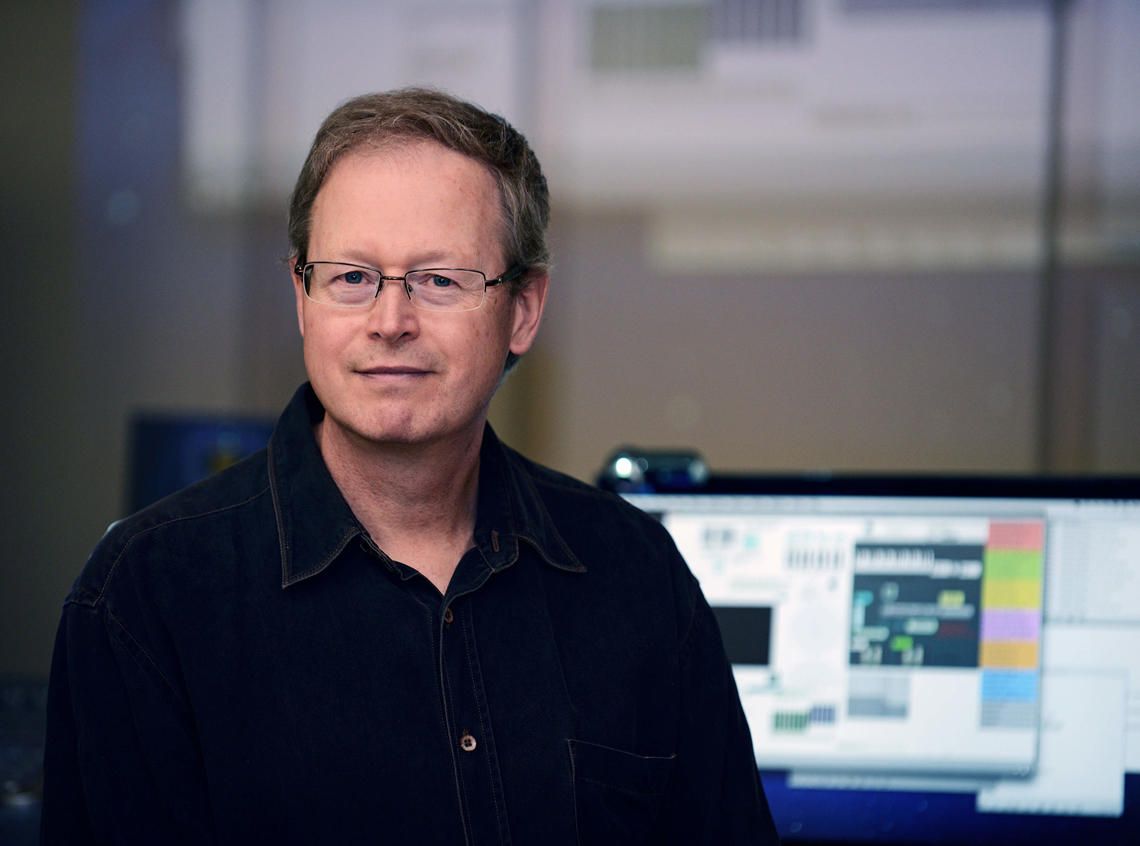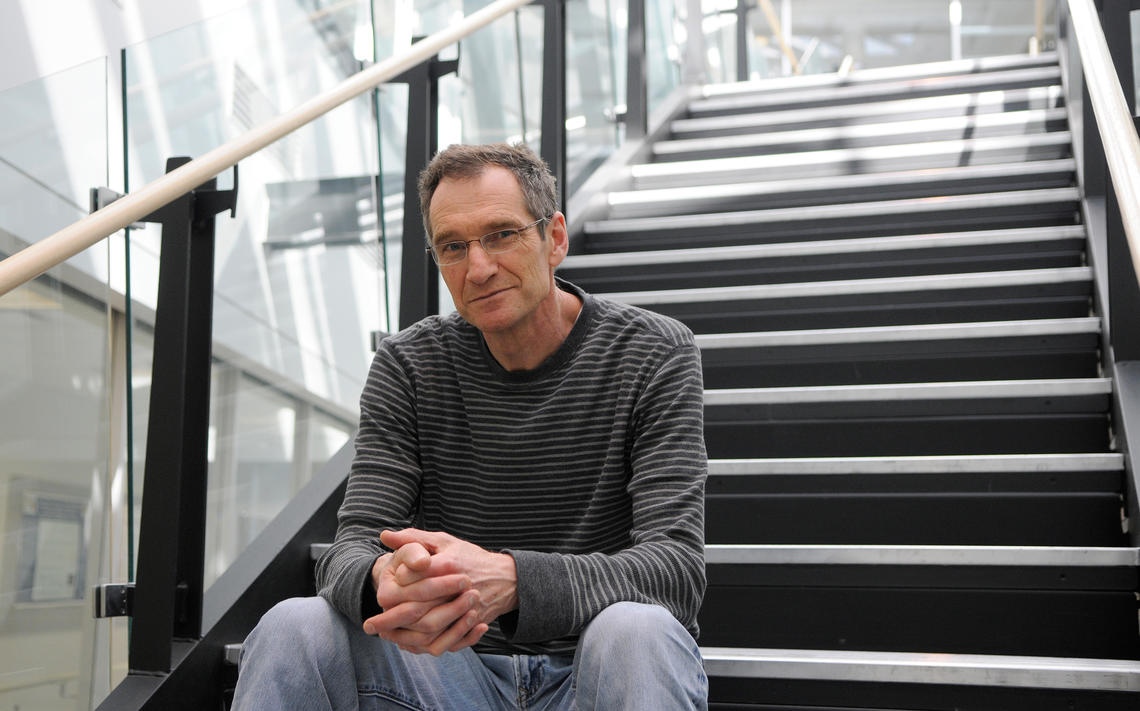Sept. 9, 2013
Royal Society of Canada names three professors as fellows

Peter Sys is a professor of neurology in the Department of Clinical Neurosciences.
Few of us follow our callings in life to receive accolades. However, when we do receive peer recognition, it can both surprise and overwhelm us all at the same time. Such are the emotions experienced by David Eagle, Walter Herzog, and Peter Stys upon being named Fellows of the Royal Society of Canada – the highest honour achievable by scholars, artists and scientists in Canada.
“I am truly humbled to be considered for this fellowship,” said Peter Stys upon hearing of the honour. “The day-to-day performance of science is often agonizing, with many failures along the way. It is extremely rewarding then to be recognized for one's efforts, and for the efforts of my many talented trainees and colleagues with whom I've had the delight of making new discoveries over the years."
Stys is a professor in the Department of Clinical Neurosciences, a Faculty of Medicine stroke neurologist in the Calgary Stroke Program at the Foothills Hospital, and a member of the Hotchkiss Brain Institute. The focus of Stys’ work is on the nerve fiber connections within the brain and spinal cord. Damage to these connections prevents nerve cells from communicating, leading to devastating and often permanent neurological disability. Many common and debilitating diseases cause damage to these connections, including multiple sclerosis, brain and spinal cord injury, stroke and Alzheimer's disease. Stys and his team are working on various aspects of these disorders to better understand how the connecting fibers are damaged and how best to preserve and restore their function.

David Eagle is a professor in the Department of Music, Faculty of Arts.
David Eagle is professor in the Faculty of Arts who teaches composition and electroacoustic music. He has created major works for soloists, chamber ensembles, orchestras and electroacoustic media. His compositions continually explore the potential of interactive computer applications in composition, improvisation, multimedia and sound spatialization. Eagle was equally touched by the honour.
"It's very rewarding because it means somebody is following my work, the music I've been composing and the musical activities I've been involved in,” Eagle said. “It recognizes that music composition is part of the intellectual life of the country — and that's a really important value that I hope we can cherish and further develop in Canada."
Walter Herzog is co-director of the Human Performance Laboratory; and professor in the faculties of Kinesiology, Engineering, Medicine, and Veterinary Medicine. His research is focused on the neuro-biomechanics of the musculoskeletal system, and his primary impact has been in the area of the molecular mechanisms of muscle contraction. Herzog also has expertise in the area of growth, healing, and adaptation of soft (ligament, tendon, muscle, and articular cartilage) and hard (bone) tissues. Within this area he works experimentally and theoretically on the molecular/cellular, in vitro, in situ, and in vivo level. It also includes cell manipulation and mechanical testing and finite element modeling, continuum mechanics, simulations and theories of growth and adaptation.

Walter Herzog is co-director of the Human Performance Laboratory and professor in multiple faculties
“I am surprised and happy and deeply honoured,” said Herzog. “Surprised primarily because there are, to my knowledge, no other scientists from my area of research (biomechanics) fellows of the Royal Society, and happy, because I hope this might provide some exposure to this relatively new scientific field.”
Founded in 1882, the Royal Society of Canada (RSC) comprises the academies of arts, humanities and sciences of Canada. Its mission is to recognize scholarly, research and artistic excellence, to advise governments and organizations, and to promote a culture of knowledge and innovation in Canada and with other national academies around the world.
This year's new fellows will be inducted to the academies of the RSC during the Induction and Awards Ceremony on Saturday, Nov. 16, 2013 at the Fairmont Banff Springs Resort in Banff. To view a complete list of newly elected Fellows and Award Winners and their nomination citations, and to register for this event, please visit the society's website.
University a sponsor of society’s AGM
The University of Calgary is proud to be a co-presenting sponsor of the RSC’s Annual General Meeting being held Nov. 14-17 at the Fairmont Banff Springs Resort. President Elizabeth Cannon and Ed McCauley, vice-president (research) will attend and speak at this annual gathering, while the University of Calgary’s professor Allan Bell will serve as artistic director. The AGM celebrates promoting Canadian research and scholarly and artistic accomplishments; recognizing academic and artistic excellence; and advising governments, NGOs, and the Canadian public on matters of public importance. The full schedule is available online at: http://rsc-src.ca/en/annual-general-meeting-2013
Panel discussion: Energy futures for our cities
The Royal Society of Canada and the Royal Society of London are hosting a roundtable at the University of Calgary on Oct. 17 where fellows from both societies will explore the challenges around powering an increasingly energy hungry society. The discussion, moderated by Ed McCauley, vice-president (research), will feature University of Calgary panelists Stephen Larter, Viola Birss, and David Layzell.
